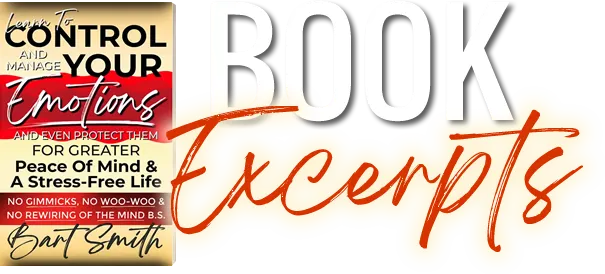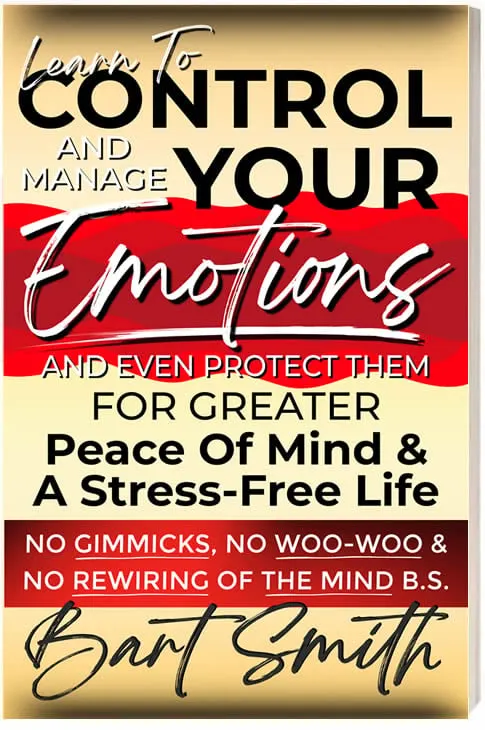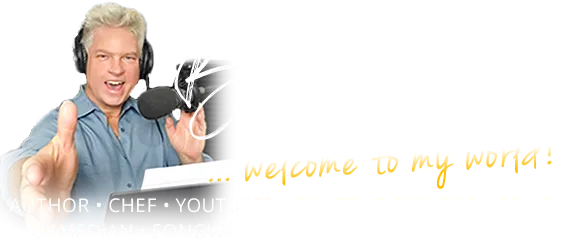
Get a sneak peek into Learn To Control, Manage & Protect Your Emotions by Bart Smith by reading a few of the hand-picked book excerpts below. If you like what you read here, then you'll definitely love the book or perhaps the audio version. That said, enjoy these excerpts!
EXCERPT #1
Emotions, what are they and can you really control them? Well, first, let’s define what emotions are exactly. Emotions are basically feelings we all experience consciously from time to time and are often accompanied by physical and/or mental behavioral changes, whether positive and/or negative. A few examples of everyday emotions might include ...
EXCERPT #2
I want to say a few things before we get into what and how we can control/manage/protect our emotions, what we say and do, and how others treat us, that do influence how our emotions effect us, for better or for worse.
EXCERPT #3
(#52) “I regret leaving the relationship on bad terms and saying the things I did. Our last moments together were filled with yelling, screaming, name calling, throwing things and well ... it didn’t end well. I could have been ...
EXCERPT #4
When it comes to controlling your emotions, there are several ways you can do so. But, first, WHY IS IT IMPORTANT for you to learn how to control your emotions? For the simple fact that if you don’t ...
EXCERPT #5
There’s a lot of talk today about “managing your emotions” and it runs along the lines of ...
EXCERPT #6
So, after all that insightful talk about Controlling and Managing one’s emotions, it’s time we spend a fair amount of time talking about Protecting our emotions. Now, specifically …
EXCERPT #7
Now, Real quick, what are Bartisms? Well, to put it simply, Bartisms are simply my personal, philosophical, intellectual and even verbal ways of dealing with others to help protect, what I said earlier, which is ...

Message From The Author
Learn To Control, Manage & Protect Your Emotions Book Excerpt
Copyright © 2025 by Bart Smith
Reprinted by permission.
Emotions, what are they and can you really control them? Well, first, let’s define what emotions are exactly.
Emotions are basically feelings we all experience consciously from time to time and are often accompanied by physical and/or mental behavioral changes, whether positive and/or negative. A few examples of everyday emotions might include:
■ Anger → A basic emotion that can be characterized by feelings of hostility, agitation, frustration, irritability, rage, and antagonism …
■ Fear → An unpleasant emotion that arises in response to perceived dangers or threats …
■ Sadness → An emotional pain associated with feelings of disadvantage, loss, despair, grief, helplessness, disappointment, and sorrow …
■ Disgust → An emotion that tends to happen because of something you dislike …
■ Surprise → An emotion that arises when we encounter sudden and unexpected sounds or movements …
■ Anxiety → An emotion characterized by feelings of tension, worried thoughts, and physical changes like increased blood pressure …
■ Guilt → An emotion that human beings experience in response to an action they have taken, a thought they had, or a feeling they experience …
■ Happiness → An emotion that occurs through feelings of joy, satisfaction, and contentment …
Emotions are often intertwined with mood, temperament, personality, disposition, or creativity. Spot on so far? The question becomes, how do we control, manage and even protect our emotions in order to help improve our daily lives and our interactions with others so we don’t experience so much anger, guilt, fear, anxiety, disgust (more often), etc., and yet feel more happiness, joy and pleasure (more often) in our lives.
CAN WE REALLY CONTROL OUR EMOTIONS
TO GENERATE MORE POSITIVE OUTCOMES
AND HOW WE FEEL MOST OF THE TIME?
To some degree, yes, but on the whole, not really. What really governs our emotions is our mind, our actions, what we say and what we do. Emotions typically come about through something you either SAY or DO (whether positive or negative) or something someone else SAYS or DOEs to us (whether positive or negative). For example, “I gave you flowers. How did that make you feel? HAPPY?” Or, “You hurt me with your words, and that made me feel sad.” Or, “I experienced ________ (situation), and because of that, it left me feeling ________ (happy/sad/fearful/ashamed/etc.).”So, you see how much our emotions are really just the result of internal and external thoughts, activities, actions, words and/or deeds or any combination of those? If that’s true, then what do we REALLY have control over to help us experience those happy emotions more of the time and not sad ones?
WHAT THEN DO WE REALLY HAVE CONTROL OVER?
What we do have (near total) control over is what we:
THIS CONTINUES IN THE BOOK!
AND, THERE'S A LOT MORE!!!
# # #
WOULD YOU LIKE TO:
RETURN TO THE:
WOULD YOU LIKE TO:
🕮 Before We Dive Into Our Emotions
Learn To Control, Manage & Protect Your Emotions Book Excerpt
Copyright © 2025 by Bart Smith
Reprinted by permission.
I want to say a few things before we get into what and how we can control/manage/protect our emotions, what we say and do, and how others treat us, that do influence how our emotions effect us, for better or for worse. First, when it comes to our feelings (or emotions), no matter what it is you’re feeling in the moment, WHEN YOU FEEL IT, I want you to:
(#1) IDENTIFY HOW (OR WHAT) YOU FEEL when your emotions are either happy or hurt. Take serious note.
— THEN —
(#2) IDENTIFY WHO caused you to feel happy or hurt, so you can take the appropriate action with words or deeds in the moment or in the future. Oh, do identify also if that person is either someone else or YOU! We do need to take personal responsibility if we keep letting something or someone continue to hurt us, right? You know the saying, "Fool me once, shame on you; fool me twice, shame on me.” That same perspective applies to who’s really hurting us (or making us feel happy). While it’s also important to understand WHY someone is hurting us, for example, sometimes we’ll never know. So, what’s best is up next …
— SIMPLY PUT —
(#3) Do you want the feeling (or emotion) you’re experiencing to STOP or be CONTINUED? By chance, if it was something bad that happened to you, could it have also been PREVENTED?
THIS CONTINUES IN THE BOOK!
AND, THERE'S A LOT MORE!!!
# # #
WOULD YOU LIKE TO:
RETURN TO THE:
WOULD YOU LIKE TO:
🕮 Difference Between Controlling, Managing & Protecting Our Emotions
Learn To Control, Manage & Protect Your Emotions Book Excerpt
Copyright © 2025 by Bart Smith
Reprinted by permission.
While all emotional control, management and protection aim to safeguard your overall emotional well-being, control is typically executed to suppress or repress certain emotions, usually for proper, healthy intentions, while managing one’s emotions focuses on understanding, accepting, responding, and utilizing key emotions to balance out healthy and effective ways that help us lead healthy and happy lives. PROTECTING one’s emotions is just what it means → protecting yourself against external and internal emotions that might get the best of you. Here's a more detailed breakdown …
CONTROLLING YOUR EMOTIONS
WHO → Who was involved the last time you either expressed some kind of emotion to the degree that it may have been deemed abnormal, unhealthy, out of line, uncalled for, damaging, hurtful – OR THE OPPOSITE – you experienced some kind of emotion internally that was devastating, hurtful, painful, distressing, depressing, sad, heart-rending, etc.? Who was it that triggered those feelings of emotion? Someone else? You? Both of you? Not to get ahead of ourselves, but are there recurring events of feeling these types of emotions with the same person, different people and/or yourself alone?
WHAT → What happened? What was it that triggered you to such a degree that you couldn’t (or didn’t) control your emotions and what type of emotion did you display? (i.e., anger, joy, disappointment, excitement, frustration, intense outbursts, difficulty calming down even in minor situations, having difficulty managing anger or frustration, raising your voice or a hand, screaming, yelling, swearing, etc.) – OR – Was it something you experienced internally that didn’t leave you feeling the best? What was it?
WHERE → Where were you when this occurred? At home, at work, out and about, over at someone’s house, where? Do you seem to experience these emotions in the same general location or do they happen just wherever you might be at the time?
THIS CONTINUES IN THE BOOK!
AND, THERE'S A LOT MORE TOO!
# # #
WOULD YOU LIKE TO:
RETURN TO THE:
WOULD YOU LIKE TO:
🕮 PART 1: Controlling Your Emotions
Learn To Control, Manage & Protect Your Emotions Book Excerpt
Copyright © 2025 by Bart Smith
Reprinted by permission.
When it comes to controlling your emotions, there are several ways you can do so. But, first, WHY IS IT IMPORTANT for you to learn how to control your emotions? For the simple fact that if you don’t → you could get yourself into a lot of trouble, either with someone else or for your personal sake! What are some examples where if you don’t control your emotions, you could get in a lot of trouble?
■ Anger → If you ever sense feelings of anger coming on in the form of hostility, agitation, frustration, irritability, rage, outbursts, screaming, yelling, and antagonism, you know what to do right? STOP IN YOUR TRACKS! Don’t throw things, don’t hit (or even touch) anyone, don’t raise your voice, don’t raise a hand, don’t do anything to yourself or private property and don’t scream, swear or yell. All those things will be remembered for a LIFETIME! Is that what you want? They say it takes seconds to hurt someone → for a LIFETIME!
So, is it really that important for you to express your rage in the form of screaming, yelling, fighting, kicking, hitting, throwing things or destroying property that might turn into a big mess to clean up later? Think twice and consider NOT ACTING on your emotions if what you might do could hurt someone else and/or yourself. PRACTICE MAKES PERFECT, though. It isn’t easy to just stop doing what came so natural before (i.e., throwing tantrums, yelling and arguing, etc.). BUT, in the long run, be SLOW TO ANGER, talk in a LOWER tone of VOICE when you’re angry. Talk SLOWER so as to not be perceived as angry. If you have to throw anything in rage, throw a napkin or a pillow case. You know, something that weighs less than an ounce and wouldn’t hurt a fly and requires no cleanup. I’ve had people tell me over the years that they could NEVER GET ME ANGRY! It’s true.
I am slow to anger, I try to see the other person’s point of view entirely before responding to the situation. You could even yell at me in a drunken rage for 30 minutes straight and when you’ve grown tired and need to catch your breath, all I’ll say is, “Are you done? Is it my turn?” And, when you say, “Yes ……” I’ll simply say, “I gotta go. See ya.” And, leave that other person hanging with all their rage. I just don’t participate in that kind of stuff. I’m busy, got things on my mind, have things to do, and I just don’t have time to get mad at you.
IF YOU ACT STUPID and do things that DO piss me off, well, I’ll just say, “See ya …” and just drop out of your life forever. I don’t bother arguing with the insane. I’d rather just flush them (and those memories) down the toilet and move on. Not to mention, I’m going to respect you immensely and require the same in return. If you don’t respect me, then I know you’ve got issues, and well, “Buh-bye!” See how that was handled? Without throwing things, raising one’s voice and without touching anyone. Another tip about arguments is, can you foresee them coming and can you prevent them. For example, in relationships, if your job (guys) is to make your gal laugh 100x a day, I don’t think you’ll be arguing.
What’s more, if you’re taller than your gal, and an argument is about to come on, guys, drop do your knees and let her yell at you. Most likely, she’ll smile and laugh at you while you hug her waist to say, “Please, honey, I don’t want to argue.” Then, she drops to her knees, y’all kiss and make up and do whatever else couples do on the floor. (HAHA)
■ Fear → If you ever feel in danger or threatened, the best thing to do is DON’T PANIC for a few seconds! Yes, do remain calm, assess the situation carefully and quickly and figure out how to GET OUT or GET AWAY or SOLVE THE ISSUE at hand as to eradicate what it is you’re fearing in the moment. Also, can it be prevented so there is no next time? What’s causing you to feel this fear? Is your life in danger? Are you at risk of losing something valuable? Assess and act!
THIS CONTINUES IN THE BOOK!
AND, THERE'S A LOT MORE!
# # #
WOULD YOU LIKE TO:
RETURN TO THE:
WOULD YOU LIKE TO:
🕮 PART 2: Managing Your Emotions
Learn To Control, Manage & Protect Your Emotions Book Excerpt
Copyright © 2025 by Bart Smith
Reprinted by permission.
There’s a lot of talk today about “managing your emotions” and it runs along the lines of → practice mindfulness, identify and address triggers, develop a broad emotional vocabulary, acknowledge your emotions, and cultivate healthy relationships, while also acknowledging, accepting and processing your feelings. Uh, okay.
One question I have about all that is WHAT DOES ANY OF THAT (REALLY) MEAN? Sure, you can take a wild (yet general) guess, but how about some SPECIFICS? What’s with all the generality? Is it because no one can truly articulate how (or what) to manage when it comes to “managing” one’s emotions?
Maybe no one’s brave enough to tell it like it is, or??? Who knows, but you see this a lot these days → ALL GENERALITIES AND NO SPECIFICS!!!
Well, let me take a stab at it, because I’ll tell you what, all of my life I’ve taken a very direct, honest and no-nonsense approach to managing my emotions which has kept me pretty sane, level-headed, living life on high (naturally speaking, of course), 99.99% stress-free and with peace of mind practically each and every day. My emotions don’t get the best of me, I’m in 99.99% complete control over my emotions, and I’d say all my emotions are generally well managed to the utmost degree every minute of the day. What else could you want, right? Granted, everyone’s circumstances, environments, lots in life (i.e., a person's experiences, and overall situation in life, often seen as determined by fate or chance) are different than mine. I get it. Still, what can we learn from each other in order to better help us (as individuals) in life, especially where our emotions are concerned? Isn’t that what books, videos, classes, speeches and people telling their stories and sharing their successes is all about? You bet.
So, for what it’s worth, I’m going to dive into how I manage (my) emotions so you might be able to glean some ideas on how you too might better manage your own through some of the insightful tips, intelligent techniques and eye-opening mental strategies I’ll share. Heaven knows, no one likes to have run-away emotions or emotions that get the best of them or emotions that get hurt or whatever else you can think of where our emotions are concerned. But, first, let’s do cover what’s out there in general and in regards to managing one’s emotions so we can compare and contrast the world’s general advice on managing one’s emotions and then mine. Fair enough?
THIS CONTINUES IN THE BOOK!
AND, THERE'S A LOT MORE!
# # #
WOULD YOU LIKE TO:
RETURN TO THE:
WOULD YOU LIKE TO:
🕮 PART 3: Protecting Your Emotions
Learn To Control, Manage & Protect Your Emotions Book Excerpt
Copyright © 2025 by Bart Smith
Reprinted by permission.
So, after all that insightful talk about Controlling and Managing one’s emotions, it’s time we spend a fair amount of time talking about Protecting our emotions. Now, specifically …
WHY DO WE WANT TO
PROTECT OUR EMOTIONS?
I don’t know about you, but I protect my emotions for:

Other reasons to protect our emotions include:
■ To prevent ourselves from getting hurt or into trouble.
■ To prevent ourselves from being bossed around, stepped on, used or abused.
■ To prevent others from knowing our personal business.
■ To prevent you from getting angry, annoyed, bothered, irate, provoked or upset which can lead to other problems.
■ To prevent you from being embarrassed or ashamed.
■ To prevent you from getting worried, anxious, nervous, bothered, stressed out, concerned, uneasy or ill at ease.
■ To save you time, money, energy, reputation, image, etc.
You see, Controlling one’s emotions had a lot to do with what you project externally towards others (and inward toward yourself to some degree). “Control your anger,” “don’t scream or yell,” “be calm, so others stay calm,” for example.
Managing one’s emotions is an internal activity that focuses on how you process, handle and manage the emotions you feel inside you as they come up as not to reflect negatively on the outside.
Protecting one’s emotions is all about shielding yourself from what others may do or say to you, which in turn, can cause your emotions to become hurt, worried, angry, felt taken advantage of, … the list goes on.
Well, now that you know WHY we need to protect our emotions, the next question is …
THIS CONTINUES IN THE BOOK!
AND, THERE'S A LOT MORE!
# # #
WOULD YOU LIKE TO:
RETURN TO THE:
WOULD YOU LIKE TO:
🕮 101+ Bartisms Designed To Protect Your Emotions
Learn To Control, Manage & Protect Your Emotions Book Excerpt
Copyright © 2025 by Bart Smith
Reprinted by permission.
LET’S GET TO IT! I HOPE
THESE HELP YOU LIKE
THEY HELP ME!
DESIGNED TO PROTECT
YOUR EMOTIONS &
OTHER PEOPLE’S
EMOTIONS AS WELL
DISCLAIMER: Do you have to follow any or all of my suggested Bartisms? ONLY if you want to. ONLY if you think they can enhance your life, protect an emotion, cause you to experience less stress, elicit less explanation, give you more privacy, more peace of mind … need I say more? Simply follow, customize and adhere to that which resonates with you and what WORKS! So, with this minor little announcement, let’s get to it, shall we?
PRESENTED IN NO
SPECIAL ORDER
(#1) CAN YOU KEEP A SECRET? SO CAN I. You know, the more you don’t tell people EVERYTHING, the less you have to explain yourself to people, justify what you’re doing, why and so forth. Stop telling people every little detail about your life, what you’re up to or want to do. By keeping your plans and what you want to do a tad secret from the world, you’re then allowed to work on (whatever you’re working on) in silence, private and without distraction. This allows you to make more progress and faster because no one is bothering you, checking up on you or even discouraging you. What I like to do is let my “finished work” do the talking for me. I had so many people tell me to stop writing books, whenever I said, “Hey, I’m writing a new book.” Well, I soon found I was better off if I didn’t tell them. Instead, when they asked me what’s new, I’d say, “Here,” and I’d stick the new book in their hand. Their response was quite the opposite when seeing the finish product. “Wow, Bart, this is cool. Can I have a copy?” This approach to keeping things a secret also lends itself to what your friends and family are doing. Don’t tell others what your friends/family are up to. It just opens the door to unwanted questioning, invasive interrogation, annoying follow-up and the like. User discretion advise, of course, but overall, in life, you’re just better off keeping more things to yourself than blabbering to the world the tiniest little details about whatever it is you’re doing under the sun. Take a lesson from music artists who work on their new albums in secret for MONTHS (even years) only to then release it with great fanfare when the time is right for the public to know about it and take action on what they release.
(#2) Now, how do you go about keeping secrets? Well, here’s how you do it → SHUT UP! What’s more, shut up more often! Instead of feeling the urge to spill your guts just for the sake of conversation or being open and honest with every little transaction in life, just clam the yapper. In fact, shut up and listen more and be heard less; not just to others, but to yourself! Your speech, when you do speak, will have more weight and meaning (and with fewer words) than if you were to yap away incessantly. Besides, no one likes a yappaholic. Also, the beauty about shutting up is no one can tell what you’re thinking, because? YOU DIDN’T SPEAK YOUR MIND! If you don’t say it, no one will know. Just go about your business and do your thing under the veil of SILENCE. Again, don’t tell people your plans to do ___ or anything. See the beauty (and weight lifted off your emotions) when you don’t tell people everything? Here’s a tip for you → talk to people on a “need-to-know” basis 60-80% of the time; that is, unless you have responsibilities to children, family, work or a spouse, etc., then you gotta talk and keep them company sometimes with conversation and getting your work done. Still, don’t give away the farm in conversation. The less said, the less information folks have to criticize, use against you, stomp all over your thoughts and dreams, etc., hence affecting your emotions in a potentially (negative) way. From now on, you’re gonna what? Shut up, more often, to give your emotions a rest from the world and their daggers. Make sense? Good. I’ll shut up now. ;-)))
THIS CONTINUES IN THE BOOK!
THERE'S 100+ MORE BARTISMS!
# # #
WOULD YOU LIKE TO:
RETURN TO THE:
WOULD YOU LIKE TO:












